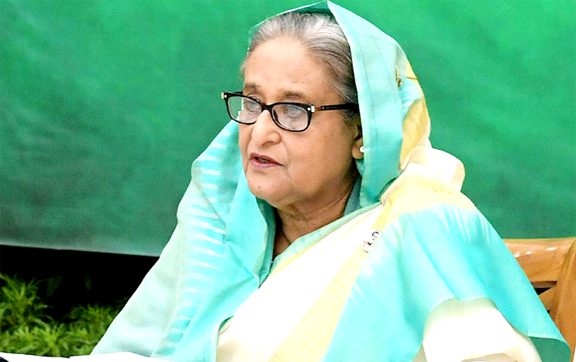DE News Desk :
The interim government has confiscated Tk 1,75,625 crore in domestic and foreign assets allegedly amassed through financial misconduct by 10 influential business conglomerates and members of the ousted Prime Minister Sheikh Hasina’s family.
The assets, attached following court orders, are part of a sweeping recovery operation spearheaded by the Bangladesh Bank in collaboration with several state agencies. The crackdown targets illicit wealth linked to embezzlement, money laundering, and abuse of political power.
The latest progress was reviewed on Monday during a high-level meeting at the Chief Adviser’s Office, where Bangladesh Bank Governor Ahsan H Mansur briefed Chief Adviser Professor Muhammad Yunus. Details were later disclosed at a press briefing held at the Foreign Service Academy in Dhaka.
Present at the briefing were Governor Mansur, Chief Adviser’s Press Secretary Shafiqul Alam, and Bangladesh Financial Intelligence Unit (BFIU) Chief AFM Shahinul Islam.
Breakdown of Seized Assets:
-
Domestic immovable assets: Tk 1,30,758 crore
-
Frozen domestic movable assets: Tk 42,614.27 crore
-
Foreign immovable assets: $164 million
-
Frozen foreign movable assets: $20.78 million
Each targeted group and the Hasina family are being investigated by dedicated joint task forces comprising officials from the Criminal Investigation Department (CID), National Board of Revenue (NBR), and the Anti-Corruption Commission (ACC). The operations are coordinated by the BFIU.
Business Groups Under Investigation:
-
S Alam Group
-
Beximco Group
-
Nabil Group
-
Summit Group
-
Orion Group
-
Gemcon Group
-
Nassa Group
-
Bashundhara Group
-
Sikder Group
-
Aramit Group
Authorities are also examining the personal finances of key stakeholders in these groups. Some of these individuals have reportedly renounced Bangladeshi citizenship, according to central bank officials.
Governor Mansur revealed that the seized wealth includes high-value real estate, large bank deposits, and equity stakes in financial institutions and public companies—many linked to individuals currently abroad or facing legal proceedings.
Future Use of Recovered Funds
The government plans to establish a special recovery fund with the seized money. This fund, initiated under the direction of the Chief Adviser, will be used to:
-
Reimburse depositors impacted by banking irregularities
-
Support struggling banks
-
Finance social safety nets for low-income communities
Assets recovered from defaulted loans will be returned directly to the affected banks to address capital deficits and provisioning gaps, Mansur added.
The governor also highlighted the government’s international cooperation efforts. Through mutual legal assistance treaties (MLATs), Bangladesh is working with foreign governments to repatriate laundered assets. Several countries have reportedly expressed willingness to support these efforts.
Chief Adviser Yunus is expected to raise the issue during his upcoming visit to London.
Regulatory Reforms and Legal Action
The central bank is finalising the implementation of the Bank Resolution Ordinance 2025, which will empower it to enforce forced mergers, liquidations, and the creation of bridge banks—measures designed to stabilise the financial sector.
In a separate revelation, Mansur accused the mobile financial service provider Nagad of illegally generating Tk 650 crore in e-money without sufficient cash backing, branding it a serious violation of monetary law. “Under the existing framework, all e-money must be fully backed by deposits. This over-issuance constitutes financial fraud and is subject to legal action,” he said.
Mansur stressed that all asset recovery and regulatory measures will strictly adhere to legal protocols and existing financial regulations.
He concluded by stating that with control over most of the attached assets already secured, operationalisation of the recovery fund is expected to proceed swiftly.

